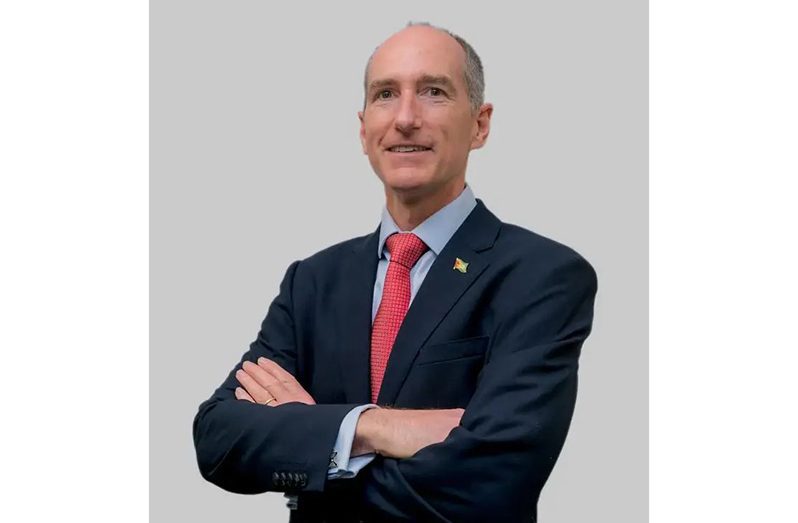–Routledge says; debunks claims of financing Guyana’s proceedings in border controversy case
PRESIDENT of ExxonMobil Guyana, Alistair Routledge, has said that the company is not financing Guyana in its case before the International Court of Justice (ICJ) regarding the ongoing border controversy with Venezuela.
He was at the time responding to questions from reporters at a press engagement at the company’s Kingston, Georgetown office, on Tuesday.
The government has long cautioned against certain media outlets and critics perpetuating false narratives, which are being exploited by Venezuelan President Nicolas Maduro in his attempts to undermine Guyana’s sovereignty.
Routledge’s remarks stem from recent developments in Venezuela, where lawmakers aligned with President Maduro approved the creation of a new state in Guyana’s resource-rich Essequibo region.
Despite ongoing proceedings before the ICJ, Venezuela has persisted in asserting its claims to Guyana’s territory, even citing a controversial 2023 December referendum as so-called justification.
In its counter-memorial to the ICJ, Venezuela falsely implicated Guyana’s government and its relationship with oil companies such as ExxonMobil.
Venezuela used the book of former Minister of Natural Resources Raphael Trotman (under the APNU+AFC government) titled,“From Destiny to Prosperity,” which they allegedly claim as evidence to prove “sponsorship and financing” of ExxonMobil of Guyana’s case.
However, when these allegations were put to Routledge, he squarely said: “We are not financing the government’s work at the ICJ.”
Attorney-General and Minister of Legal Affairs, Anil Nandlall, S.C., recently voiced deep concern over what he termed as “fabricated narratives.”
“This tendency which continues to preponderate that is to say the creation and peddling of a fabricated narrative that the government is in bed with the oil companies is unpatriotic and anti-national,” Nandlall said, as he highlighted the detrimental impact of such narratives.
The Attorney-General highlighted how President Maduro has utilised these narratives to bolster his own agenda, citing instances where Maduro presented articles from Kaieteur News during a meeting as evidence of Guyana’s alleged collusion with oil companies and the United States.
Referring to a meeting between Presidents Ali and Maduro in December 2023 in St. Vincent & the Grenadines, Nandlall recounted how Maduro leveraged public statements critical of ExxonMobil’s operations in Guyana to support his claims.
“President Maduro had volumes of these very articles and he was referring to them repeatedly in support of his contention that Guyana is selling out to the Americans and selling out to the oil companies, and that the government is selling out, and that he has articles from Guyanese newspaper that say that, not Venezuelan newspapers.
“He was throwing that in our faces, to say “look, your own people are saying that you are selling out, not Venezuelans. And we intend to take what is ours before you sell it out,”” Nandlall said.
The Attorney-General reaffirmed the government’s stance in rejecting this false narrative that it is in bed with oil companies and acting in collusion with them.
“That is a complete and utter falsehood. We are acting in the best interest of Guyana, the sector and the people of our country, but except for that privileged few who are working every day to shut the sector down,” he said.
The genesis of the border controversy goes back to the 1899 Arbitral Award, a landmark decision that delineated the boundary between Guyana and Venezuela.
Despite the historic arbitration, tensions have persisted, with Venezuela repeatedly challenging the validity of the award.
In 2018, Guyana took a decisive step by approaching the ICJ seeking affirmation of the award’s legitimacy.
Venezuela initially claimed that the ICJ lacked jurisdiction, a contention flatly rejected by the World Court in a crucial ruling in December 2020. The door was thus opened for the ICJ to delve into the merits of the substantive case.



.jpg)









